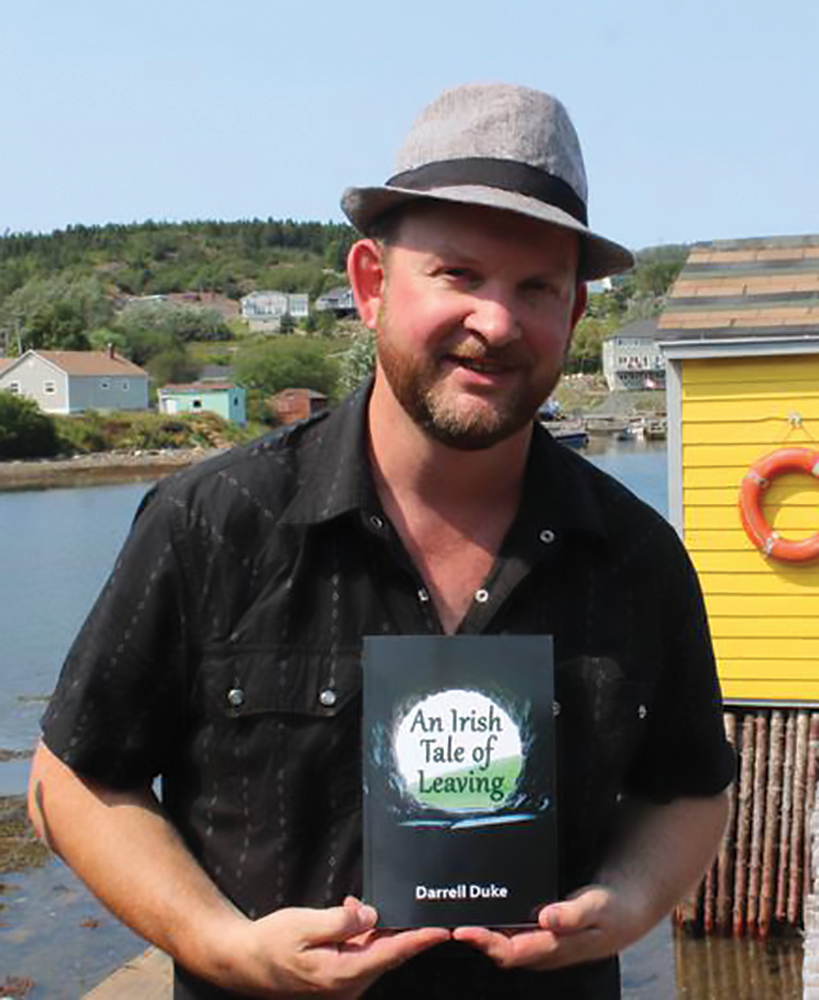When Darrell Duke penned the yarn, An Irish Tale of Leaving, he was inspired for very personal reasons
An excerpt from ‘An Irish Tale of Leaving’ penned by Darrell Duke:
My Grandfather, James Houlihan, was from the community of Argentia, once known as Little Placentia, located on the western side of Newfoundland’s Placentia Bay. His father and his father were also from there. My Great, Great, Great, Grandfather was born in Ireland, but spent most of his life at Argentia, having moved there as a child.
His father, my fourth Great Grandfather, Edward “Red” Houlihan, was from Ireland.
An Ancient Round Tower
 When I first read the line, “The musket ball hitting her sounded like a slap of a hand on the back,” I was hooked. Those were the words of Red Houlihan transcribed to paper by his great grandson, John. G. Houlihan, sometime in the late 1800s.
When I first read the line, “The musket ball hitting her sounded like a slap of a hand on the back,” I was hooked. Those were the words of Red Houlihan transcribed to paper by his great grandson, John. G. Houlihan, sometime in the late 1800s.
Without John G.’s efforts (taking the time to jot down the oral tales of Red Houlihan), it’s highly unlikely
I would have done more than pencil a sad song from scanty stories, had they survived.
Through much research by my cousin, Ed Ginn of New Jersey, around 1990, members of our family first received this vital ancestral history. Ed’s mother, Florence Houlihan Ginn, was my Grandfather’s sister who’d migrated to The States as a young woman.
Red Houlihan was born on such a magnificent chunk of rock that Newfoundlanders might struggle to consider it pride-worthy to call Newfoundland The Rock. Red’s rock is called Inis Meáin, anglicized as Inishmaan or ‘Middle Island.’ It is one of the Oileáin Árann (Aran Islands), located in Galway Bay, on Ireland’s west coast.
To the north of Inis Meáin is Árainn Mhór (mór ‘big’). It has been anglicized as Aranmore or Arranmore. The third, and smallest of the three islands, is Inis Oirthir (‘Island of the East’) and the recognized form Inis Oírr has been anglicized to Inisheer.
In 2005, in Galway, I sat in a meadow near an ancient round tower, looking at the bay and its long slabs of rock – the Aran Islands. From that view, I couldn’t imagine anyone, or anything, for that matter, living on such windswept, water-torn, cold heaps of stone. It wasn’t until I read the information given by my aunt that I realised what I’d captured seven years earlier on camera – the birthplace of my Mother’s side of the family, the Houlihans.
I ordered J.M. Synge’s The Aran Islands (1907) which paints great images of the landscape where my people once lived, worked, hid, prayed and played. To fathom they spoke another language is near impossible to grasp.
To know I speak English because my forbearers were no longer allowed to converse in their native tongue, Gaelic, or simply Irish, can be more bitter than sweet.
Leaving the homeland
Having learned of tragedies endured by Red Houlihan, the loss of a language may seem small. But, really, it was no diminutive ingredient in forcing him from his homeland. Like multiple thousands of other young Irishmen, Red was part of a group known as Rebels who rejected the tyranny of England’s militant leaders sent to Ireland to impose strict laws over every aspect of Irish people and their lives.
By 1778 the English had been in Ireland, in one form or another, for almost six hundred years. Red’s wife was shot in cold blood by British soldiers, or Peelers, the locals called them. Peelers called the likes of Red Houlihan and his comrades-in-arms Rebels.
I am aware that many of today’s natives of Ireland find it absurd to speak of atrocities committed by Great Britain in Ireland so long ago and, in the name of moving forward, I respect that.
On that note, I consider this book a form of personal closure on ancient resentments passed down through the generations.
This book is not intended as a complete history of Little Placentia/Argentia, Marquise, Newfoundland, Ireland, the American Revolution, nor England’s positions in Ireland’s past. It is a story of a man, Red Houlihan, his life in Ireland, and his departure from his homeland to Newfoundland in the 18th Century.

About the Author
Placentia author Darrell Duke writes from what he calls The Piano Shack which is an old playground playhouse he’s converted into a little get-away on the water to both write and practice music.
His children also use it for the same reason. In memory of his father, he re-used the clapboard from his childhood home in Freshwater, Placentia Bay, and painted it the colours of the Irish flag saying it’s just another way to honour Ireland, recognizing it is where his people came from.
As a songwriter, he attempted to try and capture the essence of An Irish Tale of Leaving in his song, Red Houlihan.
Before he even wrote a word for the book, he made up a tune on tin whistle which he says conveys the sadness and longing likely felt by, “hundreds of thousands of Irish men, women and children who had to turn their backs on their homeland in search of a morsel of peace, which, they found in Newfoundland.
In the book, Red plays a wooden whistle which often brings him peace when he needs it most.
Duke will perform the song he wrote for the first time in public on St. Patrick’s Day at the White Hills’ ski chalet just outside Clarenville.
